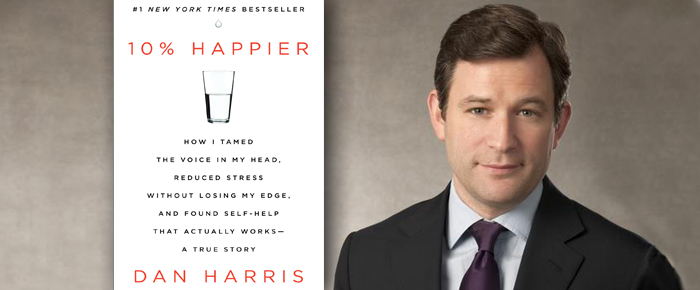
By Heidi Simmons
—–
10% Happier
by Dan Harris
Memoir
—–
It’s great to live in a country where it is a constitutional right to pursue happiness! But, sometimes that pursuit can get you down and happiness can be elusive. In Dan Harris’ 10% Happier: How I Tamed the Voices In My Head, Reduced Stress Without Losing My Edge, And Found Self-Help That Actually Works – A True Story (It Books, 256 pages), the author discovers an Eastern technique for his Western woes.
Dan Harris is a television journalist for the ABC network. He is part of ABC’s “Nightly News,” “Good Morning America” and “Nightline” broadcasts. From a young age he was competitive and ambitious.
Born in 1971, Harris was raised by “hippie” parents, both medical doctors. Harris went to yoga as a boy. Although his parents were Jewish, his mother told him there was no Santa Claus and no God.
Right out of college, Harris started his career as a news anchor in Bangor, Maine. Even in a small news market, Harris would loose his temper and stress over getting airtime even if it was only about snow.
In 2000, Harris was hired by ABC News. He was one of the youngest on the staff. Peter Jennings was his boss and mentor. Jennings was mean and demanding. Harris worked hard to please Jennings and fought to get the best assignments and his stories on the air.
Harris covered domestic and foreign news events. ABC sent him to Iraq and Afghanistan where bullets whizzed by his head. He was terrified and yet grateful the camera was rolling. When he returned home, Harris started to use drugs –cocaine and Ecstasy. He couldn’t sleep. Harris didn’t know at the time he was suffering from Post Traumatic Stress Disorder.
Besides the drugs and PTSD, Harris constantly obsessed about his job. Was he working hard enough, was he loosing his hair, how long until he was destitute and homeless and so on? His internal voice judged him, considered him an asshole and fixated on the past and the future.
News anchors are supposed to be calm and confident, but not Harris. In the competitive environment of television news, he lost it and had a breakdown live on “Good Morning America.”
Harris knew what was happening. He couldn’t read six small news stories. What came out of his mouth made no sense – so he just stopped.
His bosses didn’t know the cause of the problem but were sympathetic — worried he was ill. In fear of losing his job, Harris did not tell them the truth about the drug use, insomnia or his anxiety. But he knew he needed help and sought therapy.
Jennings assigned Harris to the “religious” beat; something Harris knew nothing about and at first resented – after all, he was an atheist. As he did the religious stories on Evangelicals and Pentecostals, he was hostile. But he began to see their passion and commitment. And they were not all idiots or nuts. He realized his job was to demystify, humanize and clarify faith for his audience.
Soon he found himself interested in Eastern thought. He interviewed Eckhart Tolle and Deepak Chopra for stories and for his own curiosity. They claimed they could be present and “live in the moment.” After study and spending time with them, Harris eventually decided they’re both “nut jobs.”
Harris decided the best chance he had to quiet the voices in his head, was to meditate. Calling on his Jew-Bu (Jewish-Buddhist) friends he decides to take mediation seriously and singed up for a ten-day retreat in Northern California.
When Harris returned to New York he found that he was passive and no longer fought for assignments and he was no longer assigned the tough stories. He had lost his edge and further was not living in the moment! Once again with the help of his Jew-Bu friends, Harris discovered a balance between being present and excelling at his job. Ultimately, Harris is content to find 10 percent more happiness as he put when asked about his change.
Author Harris is on a mission. He truly believes in the benefits of meditation. Beyond his own experience, he supports his claim with science and studies. He is hopeful that meditation will become an important part of daily life for Americans just as diet and exercise have.
10% Happier is a memoir. It is not a self-help book. But it’s a good place to start if you are considering meditation. Harris writes well. He is credible and likable. He is witty, self-deprecating and seemingly honest. He names names. This is a fascinating account of a successful broadcast journalist who learned to control his anxiety, anger and ambition through meditation.
Although Harris didn’t find “enlightenment;” ironically, his story is enlightening. He shares his personal journey. As a skeptic, he knows how silly meditation sounds. As a journalist, he asks relevant questions. As a regular guy, he finds happiness.
At the back of the book, Harris includes an “Appendix: Instructions” where he confronts reasons people give for not meditating. He has simple “Basic Mindfullness” instructions, tips and FAQs. He shows that meditation can be secular and meaningful.
Who doesn’t want to be happy? If meditation can help like diet and exercise, it’s a good thing and worth a try.












































